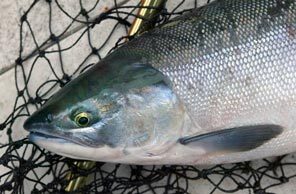forum
library
tutorial
contact

Canada, U.S. Ratify Salmon Treaty Changes
by Shayne Morrow, Canwest News ServiceTimes Colonist, January 7, 2009
|
the film forum library tutorial contact |

|
Canada, U.S. Ratify Salmon Treaty Changes
by Shayne Morrow, Canwest News ServiceTimes Colonist, January 7, 2009 |
Modifications reduce harvest levels
 Canada and the United States this week ratified changes to five chapters of the Pacific Salmon Treaty.
Canada and the United States this week ratified changes to five chapters of the Pacific Salmon Treaty.
The treaty, which was first negotiated by the Pacific Salmon Commission, provides for joint management of the five migratory salmon species from southern B.C./Washington state to Alaska and the Yukon. The announcement addressed five chapters of PST, according to Paul Sprout, regional director for Fisheries and Oceans Canada's Pacific Region.
"The first treaty was in 1985, and it got significantly revised in 1999," Sprout says. "It contains six specific chapters -- five of which expired as of January 2009."
Sprout says it's been a two-year negotiating process by PSC, which has eight commissioners each from Canada and the U.S. Each country has four panels comprised of a total of 12 members, representing the different geographical boundaries, he explains.
"Last May, PSC made a series of recommendations," Sprout says. Each country then went back to its various stakeholder groups, such as First Nations, recreational and commercial fishermen, as well as environmental groups and the public, for a period of consultation, which was completed in December, Sprout says.
"PSC made a number of recommendations to the partners -- Canada and the U.S.," Sprout says. "We've come to an agreement on how we will intercept and harvest [salmon] stocks."
The most dramatic changes to the five PST chapters involve two species of concern -- chinook and chum salmon. As a result, both parties have agreed to a fixed 20-per-cent harvest rate on Fraser River chum in Johnstone Strait, and a significant reduction in harvesting on chinook, coast-wide. There will be a compensation pool of $30 million for commercial fishermen impacted by the chinook harvest reductions "which Canada can access", according to the DFO announcement.
"What has been agreed to is a reduction in catch by 30 per cent on the B.C. Coast and 15 per cent in Alaska. The actual numbers of fish are about the same," Sprout says. "This reflects the fact that about three-quarters of the chinook caught by the B.C. troll fleet are U.S. in origin, and half the [chinook] harvested by Alaskan trollers is Canadian origin."
Related Pages:
New US-Canada Salmon Agreement Proposed by Associated Press, Intl. Herald Tribune, 5/23/8
Proposed Treaty Change would Allow More Chinook to Return by Warren Cornwall, Seattle Times, 5/22/8
learn more on topics covered in the film
see the video
read the script
learn the songs
discussion forum
